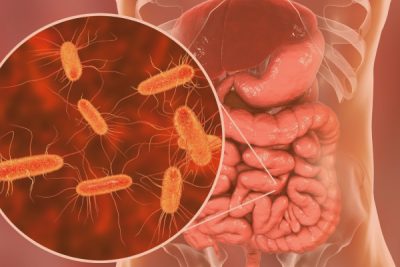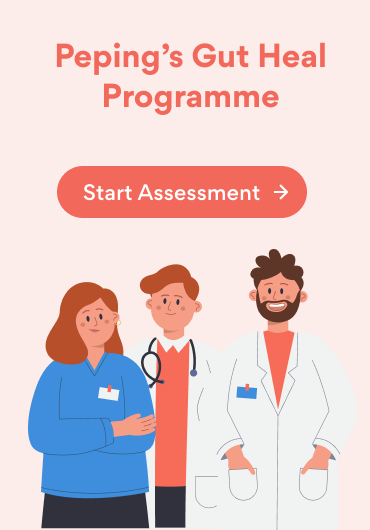Imagine that you’re at your favorite restaurant, having dinner with your family/close friends. The ambiance is captivating, and your taste buds are eagerly anticipating the upcoming explosion of flavors as you watch your favourite dishes being brought to the table. You start digging into the deliciousness in front of you, savouring each bite. But just then, when you’re in culinary bliss, a subtle discomfort starts to creep in. Abdominal cramps begin to weave their way into the picture, accompanied by that familiar feeling- a churning of the stomach that leads up to mother nature’s call. Suddenly, the harmony of the moment is disrupted and you excuse yourself from the table and rush from the scene to the nearest toilet. All this, all thanks to… you guessed it. Irritable Bowel Syndrome or IBS! Which is what we’re going to be talking about in this blog. Well, more specifically, its diagnosis, along with some insight on how to manage/treat your condition! So join us on a journey, where we explore the fascinating realm where science and investigation converge to shed light on the enigma of IBS.
The IBS Investigation Expedition
Let’s step into the shoes of someone seeking an IBS diagnosis and journey through the labyrinth of laboratory investigations. Our journey begins in the doctor’s office, where a series of tools and tests can assist in the diagnostic process. Let’s start!
Assessing Your Medical History
Our first stop is the doctor’s clinic. Here, your medical history becomes the canvas on which the physician paints a preliminary impression. By describing your symptoms, their duration, and their impact on your daily life, you provide valuable insights. Sharing details about your diet, stress levels, and lifestyle choices can also help identify patterns and triggers. The doctor may inquire about any recent infections, previous gastrointestinal surgeries, or exposure to certain medications that could potentially contribute to your symptoms. So be prepared to share everything, reader!
Ruling Out Red Flags and Understanding IBS Symptoms
Next, we encounter the concept of “red flags.” These are warning signs that warrant further investigation to rule out conditions masquerading as IBS. Symptoms such as unexplained weight loss, rectal bleeding, fever, or a family history of gastrointestinal disorders require careful consideration. By eliminating these red flags, the path to an IBS diagnosis becomes clearer.
Now, let’s understand some symptoms of IBS to keep you on your toes. While symptoms can vary from person to person, here are some common manifestations of it:
Abdominal Pain or Discomfort: Recurrent abdominal pain or discomfort is a hallmark of IBS. This pain is often described as crampy and can occur in different areas of the abdomen, such as the lower abdomen or the entire abdominal region. The intensity of the pain can range from mild to severe, and it may come and go or be constant. So be sure to listen to your tummy when it hurts!
Altered Bowel Movements: IBS can cause changes in bowel habits, which may include:
Diarrhea-Predominant (IBS-D): Individuals with IBS-D experience frequent loose or watery stools. They may have an urgent need to use the bathroom more frequently! This can disrupt daily activities and cause anxiety or embarrassment. I mean, imagine this scenario while on a date, yikes!
Constipation-Predominant (IBS-C): In IBS-C, individuals tend to have infrequent bowel movements and may experience difficulty passing stools. They may feel like their bowels are not fully empty after a bowel movement, leading to discomfort, bloating, and a sense of incomplete evacuation. Straining during bowel movements is common in this condition.
Mixed (IBS-M): Some individuals with IBS experience a mix of both diarrhea and constipation. They may alternate between loose stools and periods of constipation. Sounds like a nightmare? It can be! It is quite true that this unpredictable pattern can significantly impact an individual’s quality of life, causing frustration and anxiety.
Bloating and Gas: Many individuals with IBS experience bloating and increased stomach gas. The bloating may be more pronounced after meals or throughout the day, contributing to physical and psychological distress. Ah, those sleepless nights.
Changes in Stool Consistency: Individuals with IBS may notice changes in the consistency of their stools. These changes can range from loose and watery to hard and lumpy. The stool consistency may vary within a single day or over a longer period.
Mucus in Stools: In some cases, people with IBS may observe the presence of mucus in their stools. Mucus is a viscous substance produced by the intestines that helps with the smooth passage of stool. However, excessive mucus production or its presence in the stool can be a sign of inflammation or irritation in the digestive tract.
It’s important to remember that these symptoms alone are not enough to diagnose IBS. A comprehensive evaluation by a healthcare professional is necessary to make an accurate diagnosis and rule out other potential conditions.
Clinical Examinations: A Window into the Truth
A thorough physical examination is conducted to evaluate your abdomen, check for tenderness, and search for any unusual findings. Your doctor may palpate your abdomen to identify areas of tenderness, assess the presence of any abdominal masses, or listen for abnormal bowel sounds. And yes, your stomach might actually be calling out for help!
Diagnostic Tests: Unveiling the Laboratory Arsenal
Although IBS cannot be solely diagnosed through lab tests, they do contribute to the overall diagnostic process. The primary purpose of these tests is to exclude other conditions and provide supporting evidence for an IBS diagnosis. Here are a few commonly used tests:
- Blood Tests: Analyzing blood samples helps assess inflammation markers, detect nutritional deficiencies, and rule out conditions like celiac disease or thyroid dysfunction. Blood tests can also measure the levels of certain antibodies associated with conditions that may mimic IBS symptoms, such as inflammatory bowel disease (IBD) or autoimmune disorders!
- Stool Tests: By examining stool samples, doctors can identify signs of infections, inflammation, or malabsorption. This helps rule out conditions such as inflammatory bowel disease (IBD) or infections caused by parasites, bacteria, or viruses. Stool tests may also evaluate the presence of specific biomarker* associated with IBS, such as fecal calprotectin or lactoferrin, which can indicate intestinal inflammation.
* What is a biomarker?
A naturally occurring molecule, gene, or characteristic by which a particular disease can be identified.
Breath Tests: Certain breath tests, such as those for lactose intolerance or small intestinal bacterial overgrowth (SIBO), assist in identifying conditions that may coexist with or mimic IBS symptoms. These tests measure the gases produced by bacteria in the digestive system, providing insights into the presence of underlying conditions that can contribute to IBS symptoms.
Navigating the Lab of Life: A Holistic Perspective on IBS
As we bid farewell to the laboratory setting, it is crucial to embrace a holistic approach to managing Irritable Bowel Syndrome (IBS). While lab tests and diagnostic criteria provide valuable insights, they should be considered alongside a comprehensive evaluation of symptoms, medical history, and lifestyle factors.
Recognizing that IBS is a complex condition influenced by various interconnected factors, a multidimensional approach becomes essential in effectively managing its symptoms and improving overall well-being.
In this section, we throw light on some of the treatments and lifestyle changes that are necessary to control/ keep your IBS away.
Dietary Modifications: One of the most important aspects to managing IBS lies in making the right dietary changes. While trigger foods can vary from person to person, certain dietary modifications have shown promise in alleviating symptoms for many individuals with IBS. These include:
- Identifying and avoiding trigger foods: Keeping a food diary can help identify specific foods or ingredients that worsen symptoms. Common triggers include spicy foods, fatty foods, caffeine, alcohol, and high-fiber foods.
- Following a low-FODMAP diet: FODMAPs (fermentable oligosaccharides, disaccharides, monosaccharides, and polyols) are a group of carbohydrates that may trigger IBS symptoms. Following a low-FODMAP diet involves temporarily reducing or eliminating foods rich in these carbohydrates and gradually reintroducing them to identify personal triggers.
Too many unknown words? Here’s a simplified version of examples of FODMAPs that you may avoid, after consulting a nutritionist.
- Oligosaccharides: Wheat-based products (bread, pasta, cereals), legumes (beans, lentils, chickpeas) and certain fruits (such as watermelon, peaches, and nectarines) or vegetables (such as onions, garlic, and asparagus)
- Disaccharides: Dairy products (milk, yogurt, cheeses) or sweeteners (like lactose found in some processed foods)
- Monosaccharides: Fruits such as apples, pears, and mangoes, or honey
- Polyols: Certain fruits (such as cherries, plums, and apples), vegetables (like cauliflower, mushrooms) and sugar alcohols such as sorbitol, mannitol, and xylitol often found in sugar-free products
Note: Not all high-FODMAP foods trigger symptoms in everyone with IBS, and individual tolerance can vary. Working with a registered dietician who can provide personalized guidance and support throughout the process is highly recommended.
- Increasing fiber intake: For some individuals, increasing dietary fiber can help regulate bowel movements and relieve constipation. Gradually adding fiber-rich foods such as fruits, vegetables, and whole grains to the diet can be beneficial.
- Staying hydrated: Drinking an adequate amount of water throughout the day can help maintain healthy digestion and prevent dehydration, which can exacerbate IBS symptoms.
Stress Management: Stress and IBS often go hand in hand, with stress being a common trigger for symptom flare-ups. Managing stress levels plays a vital role in controlling IBS symptoms.
- Regular exercise: Engaging in physical activities like walking, yoga, or swimming can help reduce stress levels and promote overall well-being.
- Mind-body practices: Techniques such as deep breathing exercises, meditation, and mindfulness can help calm the mind, reduce anxiety, and improve the body’s response to stress.
- Prioritizing self-care: Carving out time for relaxation, hobbies, and activities that bring joy and promote a sense of well-being can contribute to stress reduction.
Lifestyle Adjustments: Making certain lifestyle adjustments can also have a positive impact on managing IBS symptoms. Here are a few quick tips to get started!
- Eat all your meals, regularly: Establishing regular meal times and avoiding skipping meals can help regulate bowel movements and prevent excessive hunger or overeating.
- Get some sleep: We cannot stress on this enough. Getting enough sleep is crucial for overall health and can help reduce stress levels and improve IBS symptoms.
- Smoking, quit it: Quitting smoking can have numerous health benefits, including improved digestion and a reduction in IBS symptoms.
- Talk about IBS: Building a support network of friends or family can provide emotional support, understanding, and a means to share experiences and coping strategies.
At the end of it, the path to curing IBS is an individualized journey
What works for one person may not work for another, and finding the right combination of dietary modifications, stress management techniques, and lifestyle adjustments may require some trial and error. Working closely with a healthcare professional, such as a gastroenterologist or a registered nutritionist, can provide personalized guidance and support tailored to your specific needs.
In addition to these strategies, some individuals may benefit from complementary therapies such as acupuncture, probiotics, or gut-directed hypnotherapy. These approaches, while not supported by extensive scientific evidence, have shown promise for certain individuals with IBS. It’s important to discuss these options with your doctor to determine their suitability for your specific situation.
Remember, finding the right balance is key, and it may take time and patience to discover the strategies that work best for you. With perseverance and a comprehensive approach, it is possible to navigate the challenges of IBS and regain control over your well-being.
On a parting note, we’d like to say…
While the laboratory may not hold all the answers to an IBS diagnosis, it remains an integral part of the diagnostic process. By combining various processes such as mapping out your medical history, undergoing clinical examinations, and exploring selective laboratory investigations, your doctor can help you navigate the complex labyrinth of IBS. Remember that IBS is a unique and multifaceted disorder. Through a partnership between patients, healthcare professionals, and scientific investigations, we can continue to unravel the mysteries surrounding IBS and pave the way for improved understanding, support, and management. Now, armed with this knowledge, what say we go on, go forth and take charge of the menace that is, IBS? Good luck!













